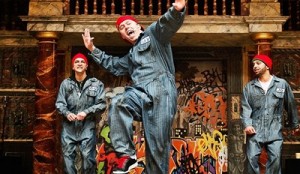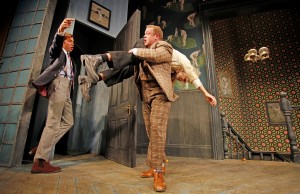Okay, recent maybe isn’t the best word. But I’ve seen some good stuff over the past few months.
A.C.T. (The American Conservatory Theater) imported The National Theatre of Scotland (whom I got to see at Mondavi earlier this year) to perform Black Watch. The Black Watch is a famous Scottish regiment (formed in 1725, first comprised of Highlanders). This play not only gives us a bit of their illustrious history, but also details their controversial tour in Iraq as part of Bush’s coalition. The play was heartbreaking and beautiful and possibly the best thing I’ve seen at A.C.T.
Two weeks ago, I saw a very abbreviated Hamlet at the Francis Ford Coppola winery. Justin Ashforth adapted, directed, and starred. And I think that was a problem. It’s a bad idea to be that close to a production, to not have the distance to see when other actors are messing up (by simply being flat, as one was) or when you’ve cut too much/not enough (e.g. why have other characters talking about Hamlet going mad when you cut out Hamlet acting mad?).
I’ve been able to see two shows by Common House productions this summer. Common House is a relatively new company in Davis. Their repertory shows this summer (out on the Wyatt Deck) were The Importance of Being Earnest and Love’s Labour’s Lost. Earnest has long been one of my favorite plays (I even taught it once, years ago). LLL isn’t one of the great ones (in terms of Shakespeare’s other works), but this production brought out the what comedy and cleverness there is in the text.
When I was in Chicago in May, Denise and I hit the Chicago Shakespeare scene, which featured an AMAZING adaptation of Othello. Othello‘s always hard to watch, but this show was a joy. Othello: The Remix is a modern adaptation of the show, done by only four actors and a D.J. The show is completely sung in hip-hop style and is about hip-hop artists (Desdemona, whom we never see, is a diva). A few of the audience members took a while to warm up to the concept, but Du and I had our hands up in the air from the very first (and got a smile from one of the writer/performers).
Not only was the show wonderfully sad and funny and old and new (complete with geek references from both renaissance and 21st century pop culture), but it was actually really close to how a Shakespeare play would have been to its audience–men playing all the roles, minimal props and sets, a focus on the sounds (audiences are called audiences because they went to “hear” a play).
Also, it was fun because one of the actors, Jackson Doran, looks a lot like our friend Ben, so we kept imagining him doing all the numbers.
In London, I got to see a few shows:
Children of the Sun at the National. I didn’t know anything about this show going in, but I’ve never seen anything bad at the National. Andrew Upton revised Gorky’s play. It’s still very . . . Russian. There’s a lot of tea, of depression, of thwarted love, of class boundaries and barriers, of servants with their ears (and hands) at the door. It ends with the rich destroyed due to what one of them did. It ends, literally, with fire. I was in the front row and I could feel the heat. (And it was surprising–London is very paranoid about fire, especially in theatres).
One Man, Two Guvnors is also an adaptation. The Commedia dell’arte play, A Servant of Two Masters, has been updated by Richard Bean. It was everything it was supposed to be–funny and farcical, with a little bit of audience participation thrown in. My one complaint is that the end of the first half is so good, that the rest of the show is anticlimactic.
The Taming of the Shrew at The Globe. Taming is another problematic play. This was my fourth time seeing it. Long ago, in Tallahassee, and a couple of years ago, at Cal Shakes, I saw “modern” adaptations in which Petruchio rode motorcycles. My favorite rendition was in Regent’s Park in London 2006. The actor playing Petruchio was older than we expected, but he was amazingly charismatic and genuinely seemed to be taken with his Kate. I saw that with my friend John Boe. Seven years later, we sat down for this all-female production. The women did a great job (especially since there were only eight of them). However, the end was a downer. Petruchio does indeed break (tame) Kate. And she remains broken. His face falls when he realizes this won’t make for a happy or lustful union. It’s probably more realistic than other versions, but I want my smart Petruchio–the one who loves her all along–despite herself–back.






